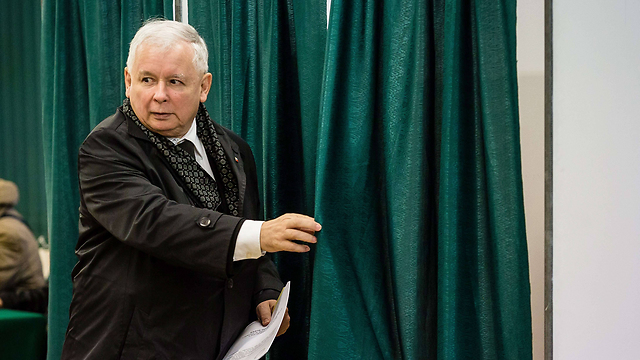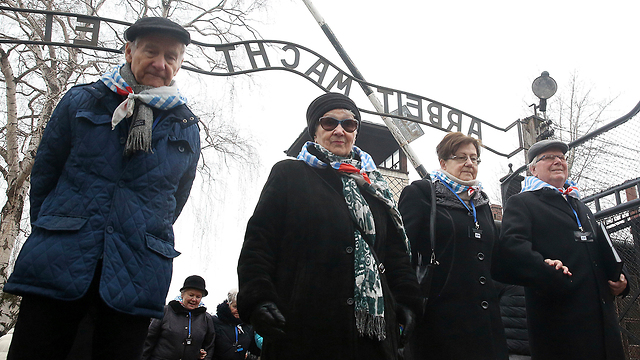In the fall of 2005, Poland held presidential elections. The winner was the candidate of conservative Catholic party Law and Justice, Lech Kaczyński, who was the mayor of Warsaw and the driving force behind the creation of the Museum of the History of Polish Jews.
“I will always stand by Israel,” he told me at the time excitedly, promising to “take every measure” to fight anti-Semitism. As president, Kaczyński visited the Great Synagogue of Warsaw, wearing a skullcap. Hanukkah candles were lit at the official presidential residence. And, in 2006 and 2008, he visited Israel.
About a year after Kaczyński’s election, the lower house of the Polish parliament (the Sejm) approved a law against the “defamation of the Polish people,” prescribing jail time for anyone who “openly accuses the Polish people of collaborating with or organizing Nazi and communist crimes on Polish soil or holds them accountable for these crimes.”

Jaroslaw Kaczynski, leader of the Law and Justice party. A global conspiracy against Poland (Photo: AFP)
Poland’s commissioner for human rights handed the law over to the constitutional court, which struck it down. The legislation was suspended. In 2010, Kaczyński was killed in a plane crash while approaching Russia. The investigation into the accident is still ongoing.
When the Law and Justice party—led by his twin brother, Jarosław Kaczyński—returned to power in 2016, discussions on the law resumed. Its wording was changed to soften resistance and emphasize its goals.
The new version, which has just been approved by Poland’s two houses of parliament, states that “whoever claims, publicly and contrary to the facts, that the Polish Nation or the Republic of Poland is responsible or co-responsible for Nazi crimes committed by the Third Reich, or whoever otherwise grossly diminishes the responsibility of the true perpetrators of said crimes shall be liable to a fine or imprisonment for up to three years.” Scientific research into the war and artistic work have been exempted, and the law applies to non-Polish citizens as well.
The approval of this ridiculous, distorted and unenforceable law outraged public opinion in Israel, from Left to Right, as well as the Israeli government, the American and Canadian ministries of foreign affairs, the global media, organizations of Holocaust survivors, and others. The row is refusing to die down and has already led to the deepest crisis in Israel-Poland relations since the Six-Day War. In 1967, Poland not only severed its diplomatic ties with Israel but also launched a campaign against the Jews, who were denounced as a “fifth column” by the secretary-general of the communist party at the time, Władysław Gomułka, in his notorious speech.
Why did the crisis break out now and not in 2006? The answer is the atmosphere and the background. In today’s Poland, anti-Semitism is proudly rearing its head, becoming a frequent visitor in the corridors of power, raging in online discourse and violently and obscenely being expressed in the state-owned media while no steps are taken against its distributors.

The Auschwitz death camp. The issue is no longer Poles' treatment of Jews during the Holocaust, but rather the Polish state's sovereignty (Photo: AP)
Many people inside and outside Poland are under the impression that the current government has accepted anti-Semitism and is even encouraging it with a wink and a nod. Anti-Jewish sentiment in this country of nearly forty million residents—less than 10,000 of which are Jewish—is bursting in a spine-tingling intensity, including among the young generation which has never even encountered a Jew.
The law against the “defamation of Poland” is seen, therefore, as part of this dark chain, legitimizing it. In his recent appearances, Law and Justice leader Jarosław Kaczyński rejected criticism against the legislation, referring to it as “an attack on Poland,” which he said was aimed at “undermining our right to national dignity… Our rivals are very strong.”
His words are clear: This is a global conspiracy against Poland. The issue is no longer Poles’ treatment of Jews during the Holocaust—Kaczyński admits that “there were Poles who murdered Jews.” The issue on the agenda is the Polish state’s sovereignty. When the legislation is presented in such nationalistic contexts, it is supported by 70 percent of Poland’s citizens.
The excellent relations between Israel and Poland can still be restored, but it will require a special Polish effort to eliminate anti-Semitism, and not just amendments of the law against “the defamation of Poland.”
The anti-Semitic demon has come out of its hiding place. It’s so dangerous, that there is a need to install concrete barriers outside the Israeli Embassy in Warsaw and tighten security around Ambassador Anna Azari, who has courageously issued harsh condemnations.
Sowing hatred, reaping anti-Semitism : http://ift.tt/2BJ5A5h
No comments:
Post a Comment